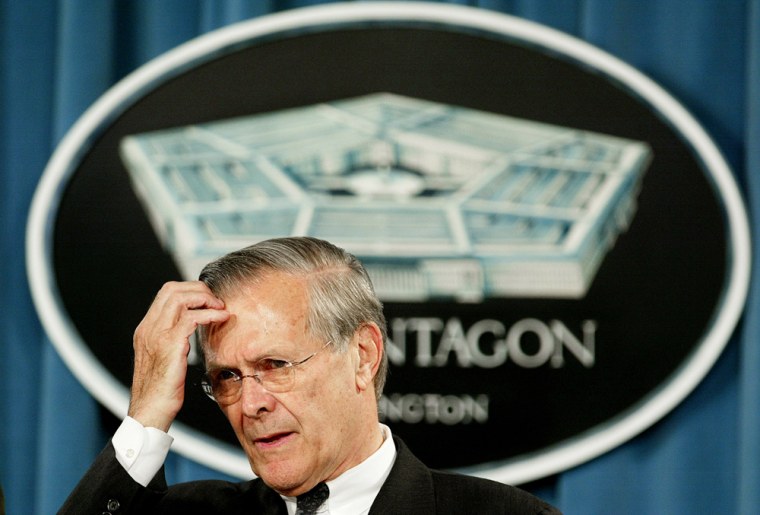Defense Secretary Donald Rumsfeld’s job security was the hot topic in Washington on Thursday as he prepared to undergo a grilling by the Senate Armed Services Committee on Friday.
In past presidencies, defense secretaries have survived worse catastrophes than the abuse scandal at the Abu Ghraib prison, but with the presidential election only six months away, President Bush and his strategists are faced with the calculation of how much damage Rumsfeld has done to the president’s Iraq strategy and to his chances of winning a second term.
To be sure, the urgent idea of the moment — firing Rumsfeld — is less of a headline-making slogan for the Democrats precisely because some of them, including presidential hopeful John Kerry, have been calling for his dismissal for months.
Last September, Kerry said Rumsfeld was handling Iraq "in an arrogant, inappropriate way that has frankly put America at jeopardy."
House Democratic Leader Nancy Pelosi called Thursday for Rumsfeld to quit.
And Sen. John McCain, R-Ariz., often cited in news media reports as evidence that “even Republicans are criticizing the administration,” has long quarreled with Rumsfeld in public hearings of the Armed Services Committee and not bothered to conceal his contempt for the defense secretary.
Rumsfeld’s reservoir of goodwill on Capitol Hill is close to empty, especially because he has angered members who argue that he did not send enough troops to Iraq last year to accomplish the mission.
A key barometer of support for Rumsfeld and Bush's Iraq policy is the sentiment among hawkish House Democrats who represent the blue-collar and rural districts where many military enlisted personnel come from.
Murtha voices anger
The point man for such Democrats, Rep. John Murtha of Pennsylvania, an ex-Marine who won a Bronze Star and two Purple Hearts in the Vietnam War, denounced the Pentagon leadership in a press conference Thursday with Pelosi standing at his side.
“Today our forces in Iraq are undermanned, under-resourced, inadequately trained, and poorly supervised. There is a lack of leadership stemming from the very top,” Murtha said. Former Army chief of Staff Eric Shinseki "said you need 200,000 people” to pacify Iraq, Murtha noted, and Rumsfeld ignored his advice, which Murtha said turned out to have been correct.
“This (Abu Ghraib) prison did not have enough people,” Murtha said. “How many other installations are undermanned? How many people are sent over there without the proper training to do the job they’re doing?”
Referring to the photos from Abu Ghraib, Murtha said, “We’re not going to recover from this damage. ... This one incident destroyed our credibility in Iraq and in all the Arab world.”
He added, “We cannot prevail in this war as the policy is going today. We either have to mobilize or we have to get out. ... The direction has got to be changed or it’s unwinnable.”
It was a thorough and damning indictment of Rumsfeld.
No call to resign
Despite his podium-pounding anger, Murtha, oddly enough, did not demand Rumsfeld’s resignation.
“I’m not willing at this point to say he ought to go,” Murtha told reporters, noting that since becoming Secretary of Defense, Rumsfeld has often called him to ask for advice. “Up until this point, he’s briefed me almost every week,” Murtha noted.
For now, many members of Congress are biding their time, emphasizing that it is always up to a president to do his own hiring and firing.
For their part, Bush aides spread the word that the ice on which Rumsfeld is skating has grown perilously thin.
An anonymous “senior White House official” told the Washington Post that Bush had privately admonished Rumsfeld on Wednesday.
The unnamed official told the Post that Bush was "not happy" with the belated way Rumsfeld told him about the Abu Ghraib investigation.
But Bush told a Rose Garden press briefing Thursday, "He's an important part of my Cabinet and he'll stay in my cabinet."
Similar situations
After the worst military catastrophe in American history up to that point, the Japanese attack on Pearl Harbor on Dec. 7, 1941, President Roosevelt did not fire Secretary of War Henry Stimson, and for good reason: Stimson, who’d served as Secretary of State and Secretary of War in earlier Republican administrations, gave bipartisan weight and credibility to FDR’s war effort.
But after the “Black Hawk Down” incident in Somalia in 1993, President Bill Clinton’s Defense Secretary Les Aspin was forced to step down because he'd lost Clinton’s support.
It’s not yet clear whether Rumsfeld is a Stimson or an Aspin.
Kerry, the man who could benefit from the dire events in Iraq, moved very cautiously Wednesday, saying only that “if I were president, we'd have a very different set of activities going on in Iraq today.” He added Thursday that "as president, I will not be the last to know what is going on in my command."
With American troops in the field under fire, there is no majority in Congress that would choose the most dramatic way to cast a vote of “no confidence” in the Bush-Rumsfeld Iraq policy: a vote to cut off funds for Iraq operations as of a certain date.
Kerry has not taken a position on the additional $25 billion that Bush is seeking for operations in Iraq and Afghanistan.
Murtha said he will continue to vote to fund operations in Iraq. “Absolutely,” he said. “I’m going to support the troops. That’s my history. I’m going to do everything I can to help the troops.”
He sounded decidedly pessimistic, however, about what will play out over the next several months in Iraq, Rumsfeld or no Rumsfeld.
“It would be a devastating international blow to us if we were to get out (of Iraq), but I don’t know (if) we have the will to mobilize now that the public has turned against it,” Murtha said.
